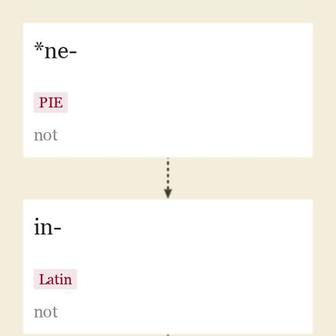indeterminism (n.)
哲学上的1874年,来自 in-(1)“不,相反的” + determinism。
最早记录年份: 1874
indeterminism 的相关词汇
determinism (n.)
1846年,由威廉·哈密尔顿引入,用于描述“必然主义哲学家的教义”(他们认为人类行为不是自由的,而是由动机必然决定的,被视为作用于人的意志或性格的外部力量)。见 determine + -ism。
Determinism does not imply materialism, atheism, or a denial of moral responsibility; while it is in direct opposition to fatalism and to the doctrine of the freedom of the will. [Century Dictionary]
Determinism 并不意味着唯物主义、无神论或否认道德责任; 它直接反对宿命论和自由意志的教义。[世纪词典]
从1876年开始,一般意义上的“一切事情都是由必然的因果链决定的教义”,源自法语 déterminisme,源自德语 Determinismus,可能是从 Praedeterminismus 中反推出来的。
in- (1)

这个词缀的意思是“不,相反,没有”(也可以是通过与后面的辅音音节化的 -n- 的同化而来的 im-, il-, ir-,这种趋势始于后期拉丁语),源自拉丁语 in- “不”,与希腊语 an-,古英语 un- 同源,均来自 PIE 词根 *ne- “不”。
在古法语和中古英语中,通常使用 en-,但大多数这些形式在现代英语中已经不再使用,只有极少数(例如 enemy)不再被视为否定的。在英语中的经验法则是,对于明显的拉丁语元素使用 in-,对于本土或本土化的元素使用 un-。